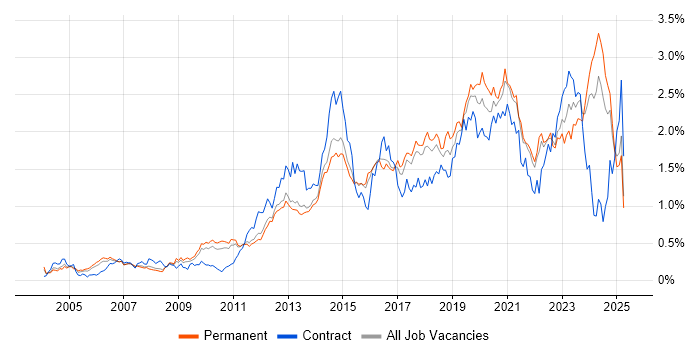Infrastructure Engineer
England > East of England
The median Infrastructure Engineer salary in the East of England is £60,000 per year, according to job vacancies posted during the 6 months leading to 5 March 2026.
The table below compares current salary benchmarking and summary statistics with the previous two years.
|
|
6 months to
5 Mar 2026 |
Same period 2025 |
Same period 2024 |
| Rank |
83 |
110 |
103 |
| Rank change year-on-year |
+27 |
-7 |
+64 |
| Permanent jobs requiring an Infrastructure Engineer |
83 |
58 |
104 |
| As % of all permanent jobs in the East of England |
1.67% |
1.91% |
2.14% |
| As % of the Job Titles category |
1.86% |
2.16% |
2.26% |
| Number of salaries quoted |
73 |
35 |
93 |
| 10th Percentile |
£40,000 |
£41,040 |
£36,250 |
| 25th Percentile |
£46,160 |
£47,125 |
£41,250 |
| Median annual salary (50th Percentile) |
£60,000 |
£55,000 |
£45,000 |
| Median % change year-on-year |
+9.09% |
+22.22% |
-10.00% |
| 75th Percentile |
£75,000 |
£60,918 |
£56,250 |
| 90th Percentile |
- |
£65,163 |
£59,750 |
| England median annual salary |
£55,000 |
£55,000 |
£50,000 |
| % change year-on-year |
- |
+10.00% |
-1.96% |
For comparison with the information above, the following table provides summary statistics for all permanent IT job vacancies in the East of England. Most job vacancies include a discernible job title that can be normalized. As such, the figures in the second row provide an indication of the number of permanent jobs in our overall sample.
| Permanent vacancies in the East of England with a recognized job title |
4,471 |
2,682 |
4,602 |
| % of permanent jobs with a recognized job title |
89.80% |
88.37% |
94.57% |
| Number of salaries quoted |
2,753 |
1,342 |
3,591 |
| 10th Percentile |
£28,150 |
£27,200 |
£26,000 |
| 25th Percentile |
£35,750 |
£38,750 |
£32,500 |
| Median annual salary (50th Percentile) |
£50,000 |
£55,000 |
£50,000 |
| Median % change year-on-year |
-9.09% |
+10.00% |
-9.09% |
| 75th Percentile |
£65,000 |
£66,295 |
£65,000 |
| 90th Percentile |
£80,000 |
£78,725 |
£77,500 |
| England median annual salary |
£55,000 |
£60,000 |
£55,000 |
| % change year-on-year |
-8.33% |
+9.09% |
-9.84% |
Infrastructure Engineer
Job Vacancy Trend in the East of England
Historical trend showing the proportion of permanent IT job postings featuring 'Infrastructure Engineer' in the job title relative to all permanent IT jobs advertised in the East of England.
Infrastructure Engineer
Salary Trend in the East of England
Salary distribution trend for Infrastructure Engineer job vacancies in the East of England.
Infrastructure Engineer
Salary Histogram in the East of England
Salary distribution for jobs citing Infrastructure Engineer in the East of England over the 6 months to 5 March 2026.
Infrastructure Engineer
Job Locations in the East of England
The table below looks at the demand and provides a guide to the median salaries quoted in IT jobs citing Infrastructure Engineer within the East of England region over the 6 months to 5 March 2026. The 'Rank Change' column provides an indication of the change in demand within each location based on the same 6 month period last year.
Infrastructure Engineer Skill Set
Top 30 Co-Occurring Skills & Capabilities in the East of England
For the 6 months to 5 March 2026, Infrastructure Engineer job roles required the following skills and capabilities in order of popularity.
The figures indicate the absolute number of co-occurrences and as a proportion of all permanent job ads across the East of England region featuring Infrastructure Engineer in the job title.
Infrastructure Engineer Skill Set
Co-Occurring Skills & Capabilities in the East of England by Category
The following tables expand on the one above by listing co-occurrences grouped by category. They cover the same employment type, locality and period, with up to 20 co-occurrences shown in each category:


